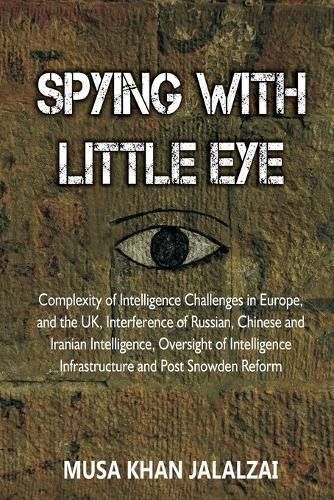Readings Newsletter
Become a Readings Member to make your shopping experience even easier.
Sign in or sign up for free!
You’re not far away from qualifying for FREE standard shipping within Australia
You’ve qualified for FREE standard shipping within Australia
The cart is loading…






This title is printed to order. This book may have been self-published. If so, we cannot guarantee the quality of the content. In the main most books will have gone through the editing process however some may not. We therefore suggest that you be aware of this before ordering this book. If in doubt check either the author or publisher’s details as we are unable to accept any returns unless they are faulty. Please contact us if you have any questions.
The war in Ukraine experimented and assessed competency of Russian, Ukrainian and European intelligence agencies by their antithetical and divergent presuppositions. Moscow, Washington, Brussels and London miscalculated Ukrainian and Russian military power. Intelligence sharing among EU member states on this catastrophic war posed a dilemma. National Security threat perception and countering foreign espionage strategies in every member state was diversified while their response to international terrorism flattered underwhelming. Intelligence agencies in all EU member states were not sure of the reciprocation of their partners. Some states remarked their security was not under threat. Some intelligence agencies feared that their big partners might not share their national data on terrorism and radicalization. Mistrust and disinformation spread across Europe. In 2020, Boris Johnson's administration published Russian intelligence report, while in 2022, British intelligence agencies yelled on the interference of Russian and Chinese intelligence agencies. The issue of foreign espionage once more appeared in newspapers, and the British Domestic Intelligence Agency (MI5) abruptly announced that Chinese intelligence agents were making things worse. The MI5 said; "a female Chinese national was engaged in political interference activities on behalf of Beijing". The death of Alexander Litvinenko and attack on Sergei Skripal prompted development of new perceptions of fear that FSB, and GRU may possibly be interfering in domestic politics. Intelligence agencies across Europe and the UK maintained a very poor record of professional approach to the war in Ukraine. Foreign intelligence agencies in the UK and EU established different espionage, terrorist, and extremist networks to influence policy-making, target their critics and promote subversive activities.
$9.00 standard shipping within Australia
FREE standard shipping within Australia for orders over $100.00
Express & International shipping calculated at checkout
This title is printed to order. This book may have been self-published. If so, we cannot guarantee the quality of the content. In the main most books will have gone through the editing process however some may not. We therefore suggest that you be aware of this before ordering this book. If in doubt check either the author or publisher’s details as we are unable to accept any returns unless they are faulty. Please contact us if you have any questions.
The war in Ukraine experimented and assessed competency of Russian, Ukrainian and European intelligence agencies by their antithetical and divergent presuppositions. Moscow, Washington, Brussels and London miscalculated Ukrainian and Russian military power. Intelligence sharing among EU member states on this catastrophic war posed a dilemma. National Security threat perception and countering foreign espionage strategies in every member state was diversified while their response to international terrorism flattered underwhelming. Intelligence agencies in all EU member states were not sure of the reciprocation of their partners. Some states remarked their security was not under threat. Some intelligence agencies feared that their big partners might not share their national data on terrorism and radicalization. Mistrust and disinformation spread across Europe. In 2020, Boris Johnson's administration published Russian intelligence report, while in 2022, British intelligence agencies yelled on the interference of Russian and Chinese intelligence agencies. The issue of foreign espionage once more appeared in newspapers, and the British Domestic Intelligence Agency (MI5) abruptly announced that Chinese intelligence agents were making things worse. The MI5 said; "a female Chinese national was engaged in political interference activities on behalf of Beijing". The death of Alexander Litvinenko and attack on Sergei Skripal prompted development of new perceptions of fear that FSB, and GRU may possibly be interfering in domestic politics. Intelligence agencies across Europe and the UK maintained a very poor record of professional approach to the war in Ukraine. Foreign intelligence agencies in the UK and EU established different espionage, terrorist, and extremist networks to influence policy-making, target their critics and promote subversive activities.